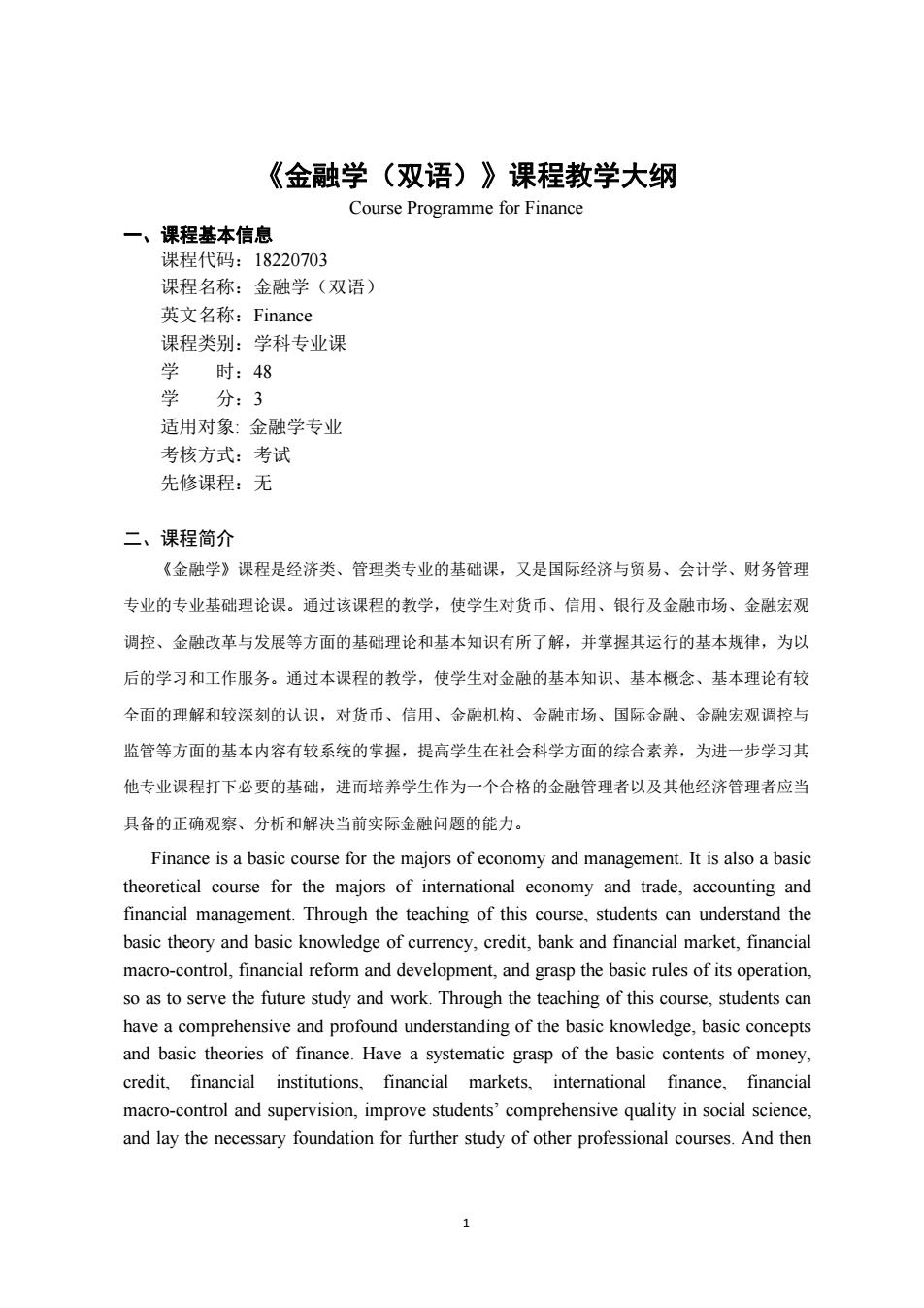
《金融学(双语)》课程教学大纲 Course Programme for Finance 一、课程基本信息 课程代码:18220703 课程名称:金融学(双语) 英文名称:Finance 课程类别:学科专业课 学 时:48 学 分:3 适用对象:金融学专业 考核方式:考试 先修课程:无 二、课程简介 《金融学》课程是经济类、管理类专业的基础课,又是国际经济与贸易、会计学、财务管理 专业的专业基础理论课。通过该课程的教学,使学生对货币、信用、银行及金融市场、金融宏观 调控、金融改革与发展等方面的基础理论和基本知识有所了解,并掌握其运行的基本规律,为以 后的学习和工作服务。通过本课程的教学,使学生对金融的基本知识、基本概念、基本理论有较 全面的理解和较深刻的认识,对货币、信用、金融机构、金融市场、国际金融、金融宏观调控与 监管等方面的基本内容有较系统的掌握,提高学生在社会科学方面的综合素养,为进一步学习其 他专业课程打下必要的基础,进而培养学生作为一个合格的金融管理者以及其他经济管理者应当 具备的正确观察、分析和解决当前实际金融问题的能力。 Finance is a basic course for the majors of economy and management.It is also a basic theoretical course for the majors of international economy and trade,accounting and financial management.Through the teaching of this course,students can understand the basic theory and basic knowledge of currency,credit,bank and financial market,financial macro-control,financial reform and development,and grasp the basic rules of its operation, so as to serve the future study and work.Through the teaching of this course,students can have a comprehensive and profound understanding of the basic knowledge,basic concepts and basic theories of finance.Have a systematic grasp of the basic contents of money, credit,financial institutions,financial markets,international finance,financial macro-control and supervision,improve students'comprehensive quality in social science, and lay the necessary foundation for further study of other professional courses.And then
1 《金融学(双语)》课程教学大纲 Course Programme for Finance 一、课程基本信息 课程代码:18220703 课程名称:金融学(双语) 英文名称:Finance 课程类别:学科专业课 学 时:48 学 分:3 适用对象: 金融学专业 考核方式:考试 先修课程:无 二、课程简介 《金融学》课程是经济类、管理类专业的基础课,又是国际经济与贸易、会计学、财务管理 专业的专业基础理论课。通过该课程的教学,使学生对货币、信用、银行及金融市场、金融宏观 调控、金融改革与发展等方面的基础理论和基本知识有所了解,并掌握其运行的基本规律,为以 后的学习和工作服务。通过本课程的教学,使学生对金融的基本知识、基本概念、基本理论有较 全面的理解和较深刻的认识,对货币、信用、金融机构、金融市场、国际金融、金融宏观调控与 监管等方面的基本内容有较系统的掌握,提高学生在社会科学方面的综合素养,为进一步学习其 他专业课程打下必要的基础,进而培养学生作为一个合格的金融管理者以及其他经济管理者应当 具备的正确观察、分析和解决当前实际金融问题的能力。 Finance is a basic course for the majors of economy and management. It is also a basic theoretical course for the majors of international economy and trade, accounting and financial management. Through the teaching of this course, students can understand the basic theory and basic knowledge of currency, credit, bank and financial market, financial macro-control, financial reform and development, and grasp the basic rules of its operation, so as to serve the future study and work. Through the teaching of this course, students can have a comprehensive and profound understanding of the basic knowledge, basic concepts and basic theories of finance. Have a systematic grasp of the basic contents of money, credit, financial institutions, financial markets, international finance, financial macro-control and supervision, improve students’ comprehensive quality in social science, and lay the necessary foundation for further study of other professional courses. And then
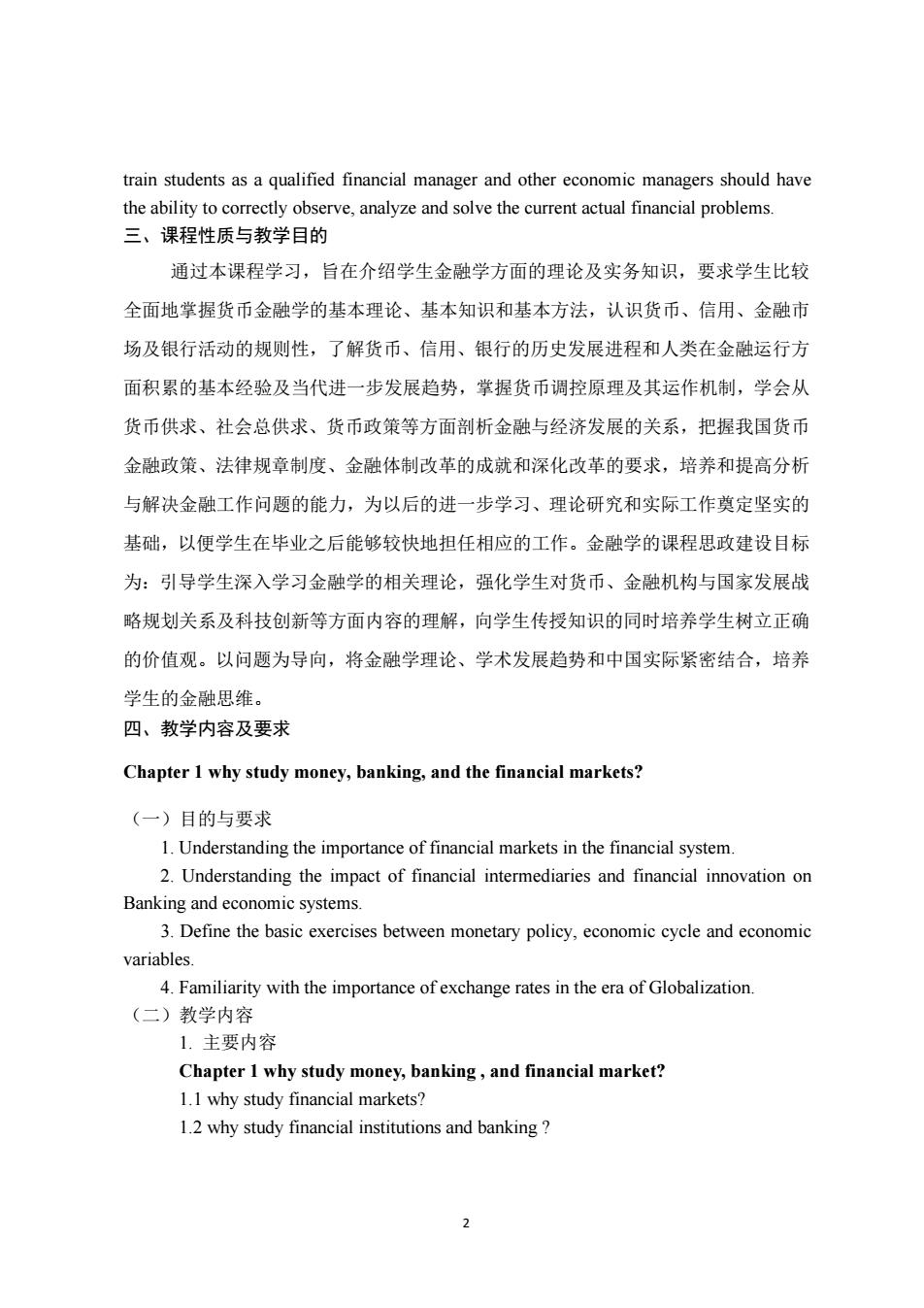
train students as a qualified financial manager and other economic managers should have the ability to correctly observe,analyze and solve the current actual financial problems 三、课程性质与教学目的 通过本课程学习,旨在介绍学生金融学方面的理论及实务知识,要求学生比较 全面地掌握货币金融学的基本理论、基本知识和基本方法,认识货币、信用、金融市 场及银行活动的规则性,了解货币、信用、银行的历史发展进程和人类在金融运行方 面积累的基本经验及当代进一步发展趋势,掌握货币调控原理及其运作机制,学会从 货币供求、社会总供求、货币政策等方面剖析金融与经济发展的关系,把握我国货币 金融政策、法律规章制度、金融体制改革的成就和深化改革的要求,培养和提高分析 与解决金融工作问题的能力,为以后的进一步学习、理论研究和实际工作奠定坚实的 基础,以便学生在毕业之后能够较快地担任相应的工作。金融学的课程思政建设目标 为:引导学生深入学习金融学的相关理论,强化学生对货币、金融机构与国家发展战 略规划关系及科技创新等方面内容的理解,向学生传授知识的同时培养学生树立正确 的价值观。以问题为导向,将金融学理论、学术发展趋势和中国实际紧密结合,培养 学生的金融思维。 四、教学内容及要求 Chapter 1 why study money,banking,and the financial markets? (一)目的与要求 1.Understanding the importance of financial markets in the financial system. 2.Understanding the impact of financial intermediaries and financial innovation on Banking and economic systems. 3.Define the basic exercises between monetary policy,economic cycle and economic variables 4.Familiarity with the importance of exchange rates in the era of Globalization. (二)教学内容 1.主要内容 Chapter 1 why study money,banking,and financial market? 1.1 why study financial markets? 1.2 why study financial institutions and banking?
2 train students as a qualified financial manager and other economic managers should have the ability to correctly observe, analyze and solve the current actual financial problems. 三、课程性质与教学目的 通过本课程学习,旨在介绍学生金融学方面的理论及实务知识,要求学生比较 全面地掌握货币金融学的基本理论、基本知识和基本方法,认识货币、信用、金融市 场及银行活动的规则性,了解货币、信用、银行的历史发展进程和人类在金融运行方 面积累的基本经验及当代进一步发展趋势,掌握货币调控原理及其运作机制,学会从 货币供求、社会总供求、货币政策等方面剖析金融与经济发展的关系,把握我国货币 金融政策、法律规章制度、金融体制改革的成就和深化改革的要求,培养和提高分析 与解决金融工作问题的能力,为以后的进一步学习、理论研究和实际工作奠定坚实的 基础,以便学生在毕业之后能够较快地担任相应的工作。金融学的课程思政建设目标 为:引导学生深入学习金融学的相关理论,强化学生对货币、金融机构与国家发展战 略规划关系及科技创新等方面内容的理解,向学生传授知识的同时培养学生树立正确 的价值观。以问题为导向,将金融学理论、学术发展趋势和中国实际紧密结合,培养 学生的金融思维。 四、教学内容及要求 Chapter 1 why study money, banking, and the financial markets? (一)目的与要求 1. Understanding the importance of financial markets in the financial system. 2. Understanding the impact of financial intermediaries and financial innovation on Banking and economic systems. 3. Define the basic exercises between monetary policy, economic cycle and economic variables. 4. Familiarity with the importance of exchange rates in the era of Globalization. (二)教学内容 1. 主要内容 Chapter 1 why study money, banking , and financial market? 1.1 why study financial markets? 1.2 why study financial institutions and banking ?
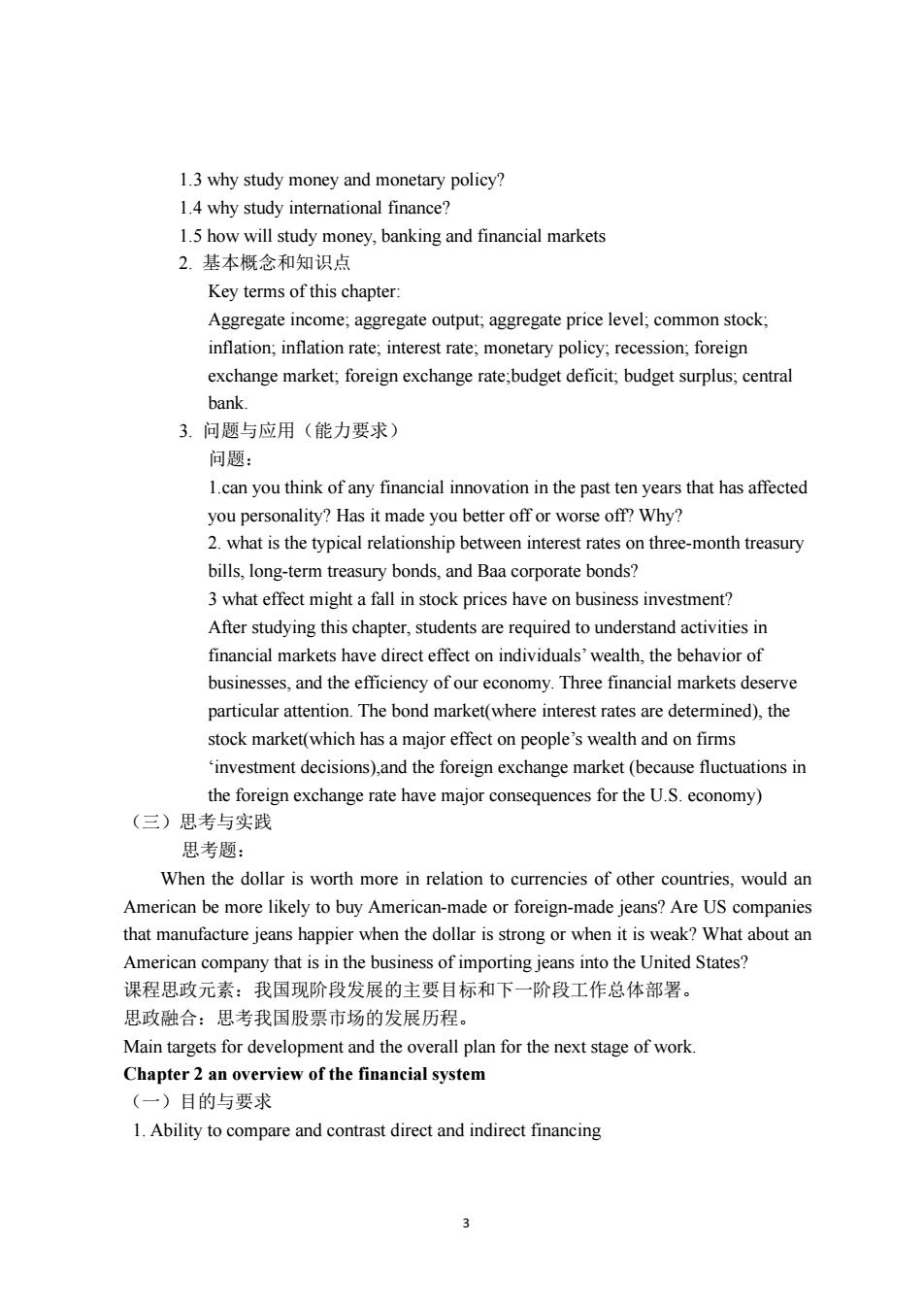
1.3 why study money and monetary policy? 1.4 why study international finance? 1.5 how will study money,banking and financial markets 2.基本概念和知识点 Key terms of this chapter Aggregate income:aggregate output;aggregate price level;common stock: inflation;inflation rate:interest rate:monetary policy:recession:foreign exchange market,foreign exchange rate;budget deficit,budget surplus;central bank 3.问题与应用(能力要求) 问题: 1.can you think of any financial innovation in the past ten years that has affected you personality?Has it made you better off or worse of?Why? 2.what is the typical relationship between interest rates on three-month treasury bills,long-term treasury bonds,and Baa corporate bonds? 3 what effect might a fall in stock prices have on business investment? After studying this chapter,students are required to understand activities in financial markets have direct effect on individuals'wealth.the behavior of businesses,and the efficiency of our economy.Three financial markets deserve particular attention.The bond market(where interest rates are determined),the stock market(which has a major effect on people's wealth and on firms 'investment decisions),and the foreign exchange market(because fluctuations in the foreign exchange rate have major consequences for the U.S.economy) (三)思考与实践 思考题: When the dollar is worth more in relation to currencies of other countries,would an American be more likely to buy American-made or foreign-made jeans?Are US companies that manufacture jeans happier when the dollar is strong or when it is weak?What about an American company that is in the business of importing jeans into the United States? 课程思政元素:我国现阶段发展的主要目标和下一阶段工作总体部署。 思政融合:思考我国股票市场的发展历程。 Main targets for development and the overall plan for the next stage of work Chapter 2 an overview of the financial system (一)目的与要求 1.Ability to compare and contrast direct and indirect financing 3
3 1.3 why study money and monetary policy? 1.4 why study international finance? 1.5 how will study money, banking and financial markets 2. 基本概念和知识点 Key terms of this chapter: Aggregate income; aggregate output; aggregate price level; common stock; inflation; inflation rate; interest rate; monetary policy; recession; foreign exchange market; foreign exchange rate;budget deficit; budget surplus; central bank. 3. 问题与应用(能力要求) 问题: 1.can you think of any financial innovation in the past ten years that has affected you personality? Has it made you better off or worse off? Why? 2. what is the typical relationship between interest rates on three-month treasury bills, long-term treasury bonds, and Baa corporate bonds? 3 what effect might a fall in stock prices have on business investment? After studying this chapter, students are required to understand activities in financial markets have direct effect on individuals’ wealth, the behavior of businesses, and the efficiency of our economy. Three financial markets deserve particular attention. The bond market(where interest rates are determined), the stock market(which has a major effect on people’s wealth and on firms ‘investment decisions),and the foreign exchange market (because fluctuations in the foreign exchange rate have major consequences for the U.S. economy) (三)思考与实践 思考题: When the dollar is worth more in relation to currencies of other countries, would an American be more likely to buy American-made or foreign-made jeans? Are US companies that manufacture jeans happier when the dollar is strong or when it is weak? What about an American company that is in the business of importing jeans into the United States? 课程思政元素:我国现阶段发展的主要目标和下一阶段工作总体部署。 思政融合:思考我国股票市场的发展历程。 Main targets for development and the overall plan for the next stage of work. Chapter 2 an overview of the financial system (一)目的与要求 1. Ability to compare and contrast direct and indirect financing
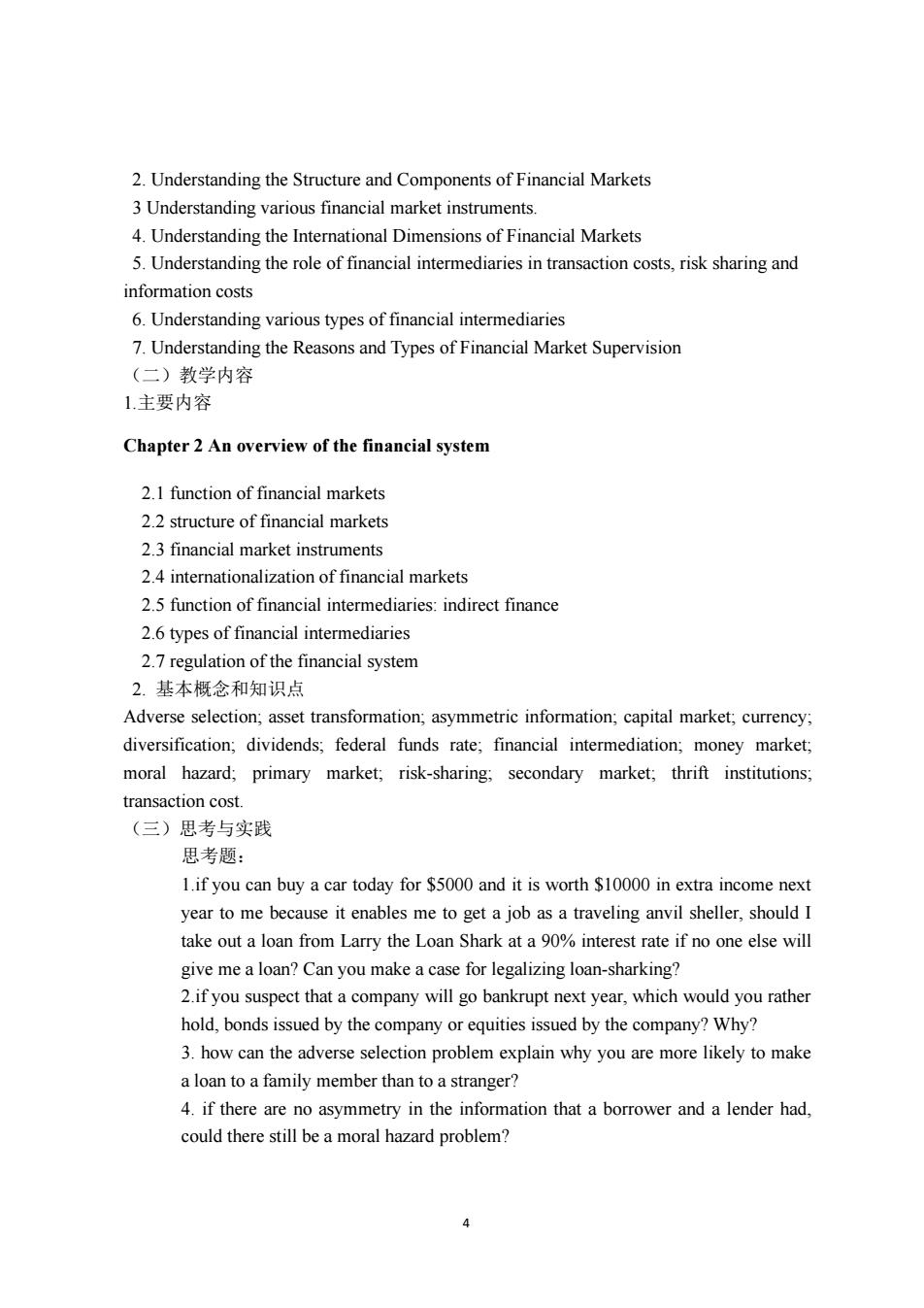
2.Understanding the Structure and Components of Financial Markets 3 Understanding various financial market instruments 4.Understanding the International Dimensions of Financial Markets 5.Understanding the role of financial intermediaries in transaction costs,risk sharing and information costs 6.Understanding various types of financial intermediaries 7.Understanding the Reasons and Types of Financial Market Supervision (二)教学内容 1.主要内容 Chapter 2 An overview of the financial system 2.1 function of financial markets 2.2 structure of financial markets 2.3 financial market instruments 2.4 internationalization of financial markets 2.5 function of financial intermediaries:indirect finance 2.6 types of financial intermediaries 2.7 regulation of the financial system 2.基本概念和知识点 Adverse selection,asset transformation,asymmetric information,capital market,curency: diversification;dividends;federal funds rate;financial intermediation;money market; moral hazard:primary market:risk-sharing:secondary market:thrift institutions transaction cost (三)思考与实践 思考题: 1.if you can buy a car today for $5000 and it is worth $10000 in extra income next vear to me because it enables me to get a iob as a traveling anvil sheller.should i take out a loan from Larry the Loan Shark at a90%interest rate if no one else wil give me a loan?Can you make a case for legalizing loan-sharking? 2.if you suspect that a company will go bankrupt next year,which would you rather hold,bonds issued by the company or equities issued by the company?Why? 3.how can the adverse selection problem explain why you are more likely to make a loan to a family member than to a stranger? 4.if there are no asymmetry in the information that a borrower and a lender had, could there still be a moral hazard problem? 4
4 2. Understanding the Structure and Components of Financial Markets 3 Understanding various financial market instruments. 4. Understanding the International Dimensions of Financial Markets 5. Understanding the role of financial intermediaries in transaction costs, risk sharing and information costs 6. Understanding various types of financial intermediaries 7. Understanding the Reasons and Types of Financial Market Supervision (二)教学内容 1.主要内容 Chapter 2 An overview of the financial system 2.1 function of financial markets 2.2 structure of financial markets 2.3 financial market instruments 2.4 internationalization of financial markets 2.5 function of financial intermediaries: indirect finance 2.6 types of financial intermediaries 2.7 regulation of the financial system 2. 基本概念和知识点 Adverse selection; asset transformation; asymmetric information; capital market; currency; diversification; dividends; federal funds rate; financial intermediation; money market; moral hazard; primary market; risk-sharing; secondary market; thrift institutions; transaction cost. (三)思考与实践 思考题: 1.if you can buy a car today for $5000 and it is worth $10000 in extra income next year to me because it enables me to get a job as a traveling anvil sheller, should I take out a loan from Larry the Loan Shark at a 90% interest rate if no one else will give me a loan? Can you make a case for legalizing loan-sharking? 2.if you suspect that a company will go bankrupt next year, which would you rather hold, bonds issued by the company or equities issued by the company? Why? 3. how can the adverse selection problem explain why you are more likely to make a loan to a family member than to a stranger? 4. if there are no asymmetry in the information that a borrower and a lender had, could there still be a moral hazard problem?
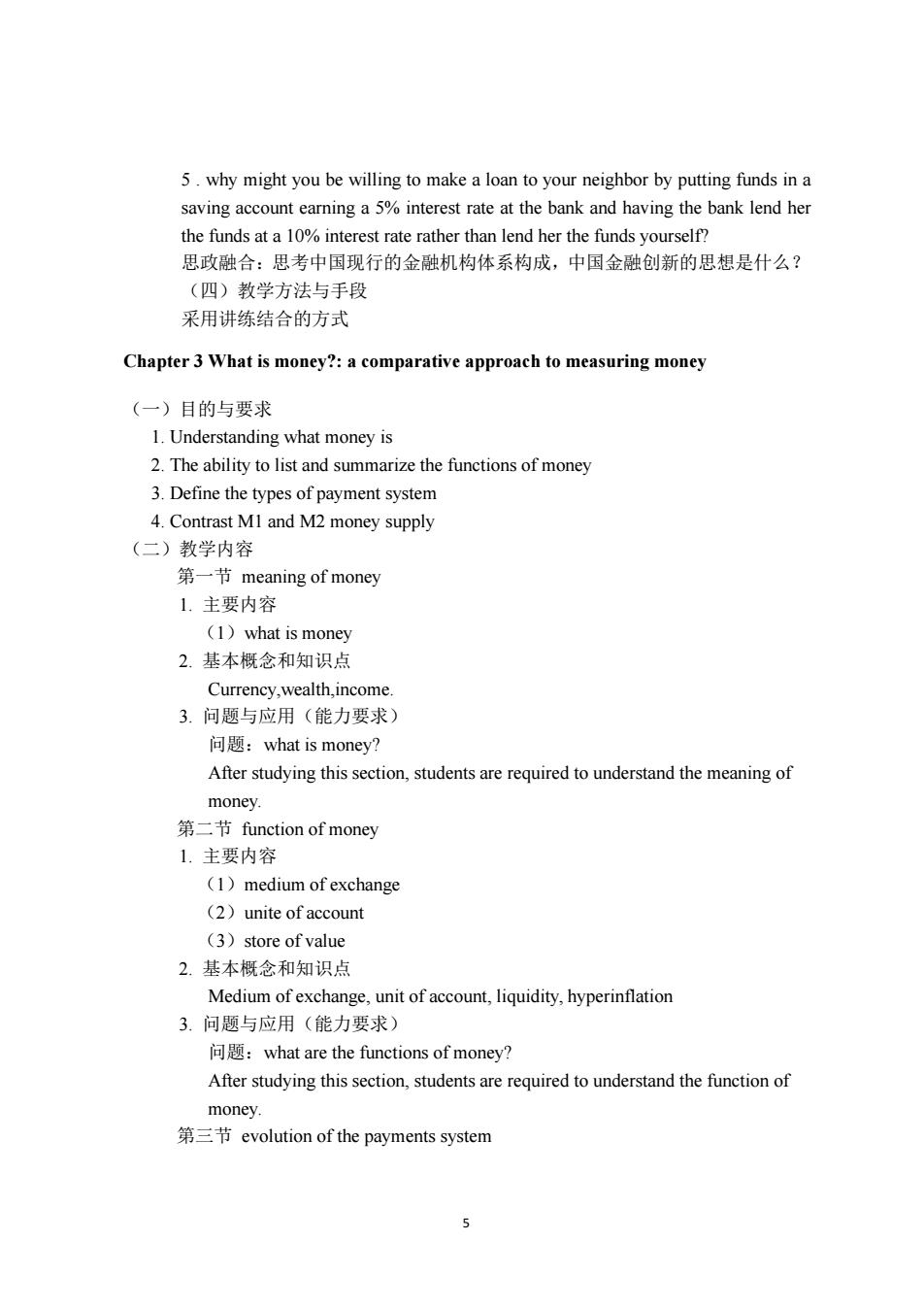
5.why might you be willing to make a loan to your neighbor by putting funds in a saving account earning a 5%interest rate at the bank and having the bank lend her the funds at a 10%interest rate rather than lend her the funds yourself? 思政融合:思考中国现行的金融机构体系构成,中国金融创新的思想是什么 (四)教学方法与手段 采用讲练结合的方式 Chapter 3 What is money?:a comparative approach to measuring money (一)目的与要求 1.Understanding what money is 2.The ability to list and summarize the functions of money 3.Define the types of payment system 4.Contrast MI and M2 money supply (二)教学内容 第一节meaning of money 1.主要内容 (1)what is money 2.基本概念和知识点 Currency wealth income 3.问题与应用(能力要求, 问题:what is money? After studying this section,students are required to understand the meaning of monev. 第二节function of money 1.主要内容 (1)medium of exchange (2)unite of account (3)store of value 2.基本概念和知识点 Medium of exchange,unit of account,liquidity,hyperinflation 3.问题与应用(能力要求) 何题:what are the functions of monev? After studying this section,students are required to understand the function of money. 第三节evolution of the payments system
5 5 . why might you be willing to make a loan to your neighbor by putting funds in a saving account earning a 5% interest rate at the bank and having the bank lend her the funds at a 10% interest rate rather than lend her the funds yourself? 思政融合:思考中国现行的金融机构体系构成,中国金融创新的思想是什么? (四)教学方法与手段 采用讲练结合的方式 Chapter 3 What is money?: a comparative approach to measuring money (一)目的与要求 1. Understanding what money is 2. The ability to list and summarize the functions of money 3. Define the types of payment system 4. Contrast M1 and M2 money supply (二)教学内容 第一节 meaning of money 1. 主要内容 (1)what is money 2. 基本概念和知识点 Currency,wealth,income. 3. 问题与应用(能力要求) 问题:what is money? After studying this section, students are required to understand the meaning of money. 第二节 function of money 1. 主要内容 (1)medium of exchange (2)unite of account (3)store of value 2. 基本概念和知识点 Medium of exchange, unit of account, liquidity, hyperinflation 3. 问题与应用(能力要求) 问题:what are the functions of money? After studying this section, students are required to understand the function of money. 第三节 evolution of the payments system